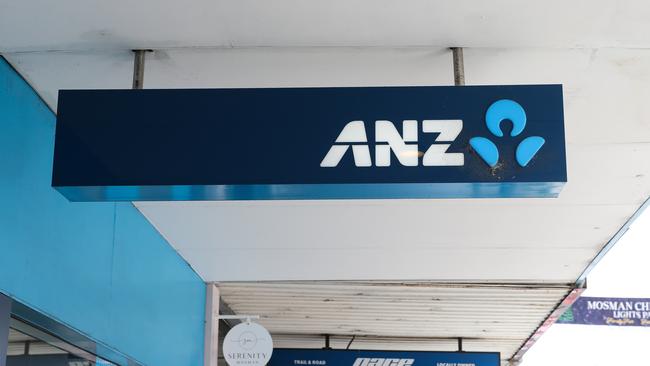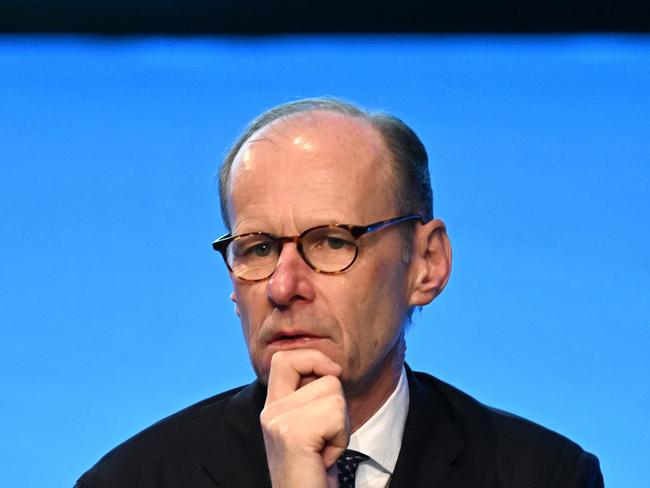Protesters clash with ANZ over its climate and military funding
Protesters have targeted ANZ bosses over the bank’s ties to the world’s largest weapons company and its funding of major polluters.
ANZ faced fiery questions from activists both before and during its annual general meeting on Thursday.
Protesters from the pro-Palestine, climate and environment movements are angry over the bank’s financial ties to the world’s largest weapons company, Lockheed Martin. According to the protesters, ANZ helped facilitate more than $US23bn ($A37bn) worth of bond financing for Lockheed Martin.

“ANZ must comply with international humanitarian law and end its funding of weapons manufacturers like Lockheed Martin profiting off the sale of arms and munitions to Israel, who are committing war crimes and genocide, as noted by Amnesty International and UN Special Committee,” Palestinian activist Amin Abbas said.
In a statement prior to the AGM, protesters said they also planned to be at the AGM as proxies to put questions directly to ANZ over funding military activities.
ANZ chair Paul O’Sullivan said prior to the meeting he was aware of potential issues with protesters and took provisions to protect shareholders.
“We took extra security measures to make sure we could safeguard everyone attending,” he said.
Protesters did not crash the meeting, although questions on military funding were asked to the board.
“We have a clear policy of not directly financing weapons, with the exception made for Australian and New Zealand governments,” Mr O’Sullivan said.
“We have a clear screening process so we know what our money is used for.”
ANZ also faced questions about funding large polluters, including oil and gas companies.
“We have committed to reducing our exposure to oil and gas over time. All those goals are consistent with the Paris agreement,” Mr O’Sullivan said.
ANZ faces first strike
ANZ has noted its almost certain first strike against the bank’s remuneration report as it pulled a motion to grant shares to chief executive Shayne Elliott.
Mr O’Sullivan said the bank was aware only 60 per cent of shareholders had voted in support of the report this year.
“A significant number of shareholders do not,” he said.
If more than 25 per cent of shareholders vote against the report, it will be deemed a first strike, which, if repeated next year, can cause a spill of ANZ’s board.

Shareholders were planning on voting against a resolution seeking to approve performance rights for Mr Elliott. ANZ instead chose to withdraw the resolution.
Mr O’Sullivan said before the meeting “we received majority support from shareholders to grant our CEO his long-term variable remuneration; however, a substantial proportion of shareholders voted against the resolution.
”In recognition of shareholder views, to limit the impact on the bank and to allow it to move forward, Shayne has decided to forfeit this year’s long-term variable remuneration.”
This means Mr Elliott will forfeit more than $2.3m in additional shares.
Proxy votes ahead of the meeting showed 49.23 per cent of shareholders voted against ANZ’s resolution to grant Mr Elliott restricted rights and performance rights.
Acknowledging an expected strike against ANZ’s remuneration report, Mr O’Sullivan said ANZ considered shareholders’ best interests when deciding performance bonuses.
Banking regulator APRA recently hit ANZ with a $250m capital penalty, warning the bank that it was failing to manage non-financial risks.
Mr O’Sullivan said recent events in the bank’s markets business “highlighted the need to do much more” in non-financial risk improvement.
The Australia also reports that corporate watchdog ASIC is also weighing up whether to launch enforcement action against ANZ in the new year.
ASIC is investigating, among other concerns within ANZ’s retail division, the bank’s failure to stop or refund fees levied to deceased estates after customers’ deaths.
According to reports, up to 20,000 customers have been entangled in the matter, which also involves allegations of ANZ not responding to the representatives of deceased estates within a required 14-day period.
“Like all financial services organisations, we are in constant dialogue with regulators about a variety of matters and any questions on specifics should be directed to ASIC,” an ANZ spokesman said.
At the time of writing, ANZ shares were down 2.4 per cent to $28.65 on a bleak day all around for shareholders.


